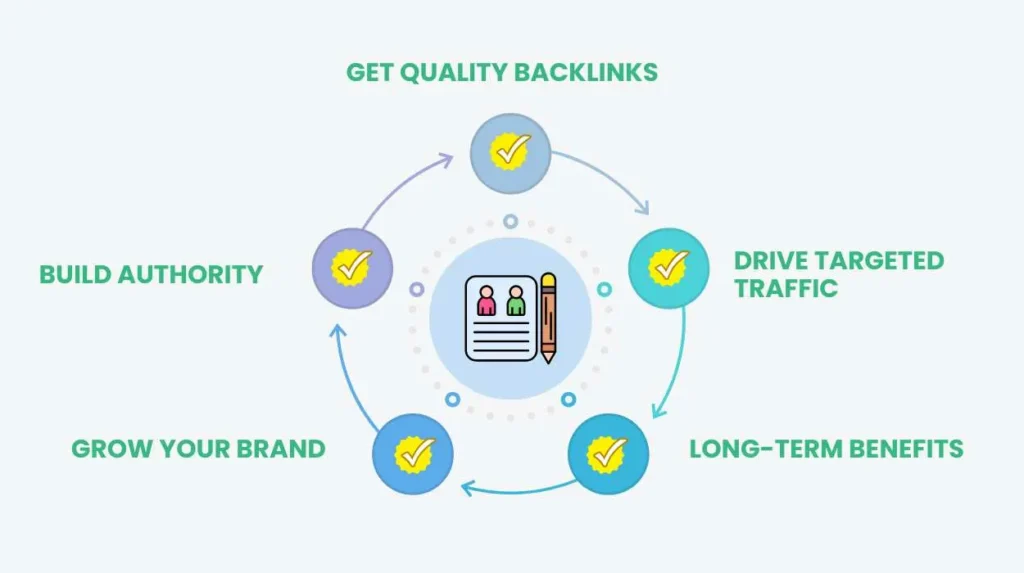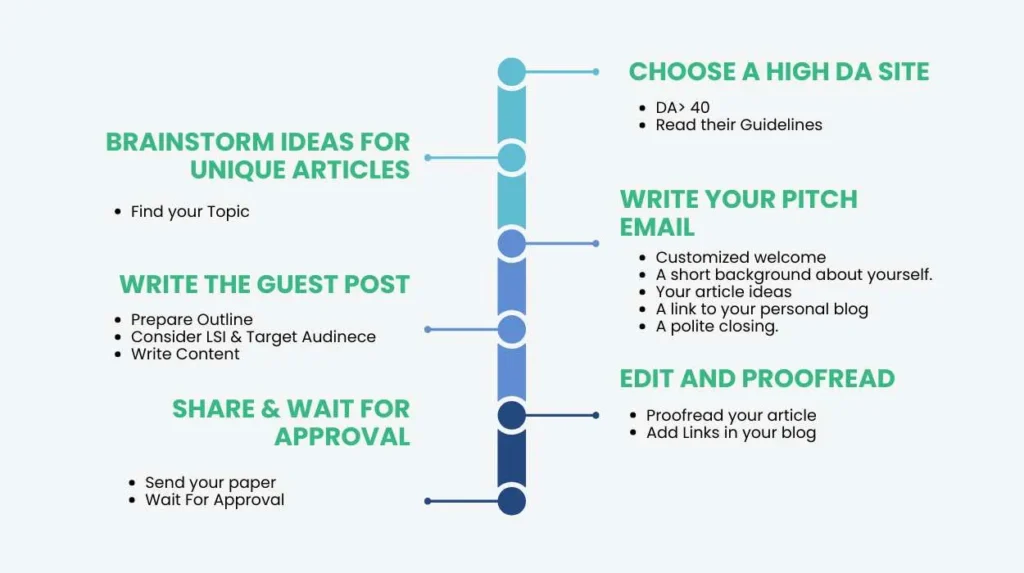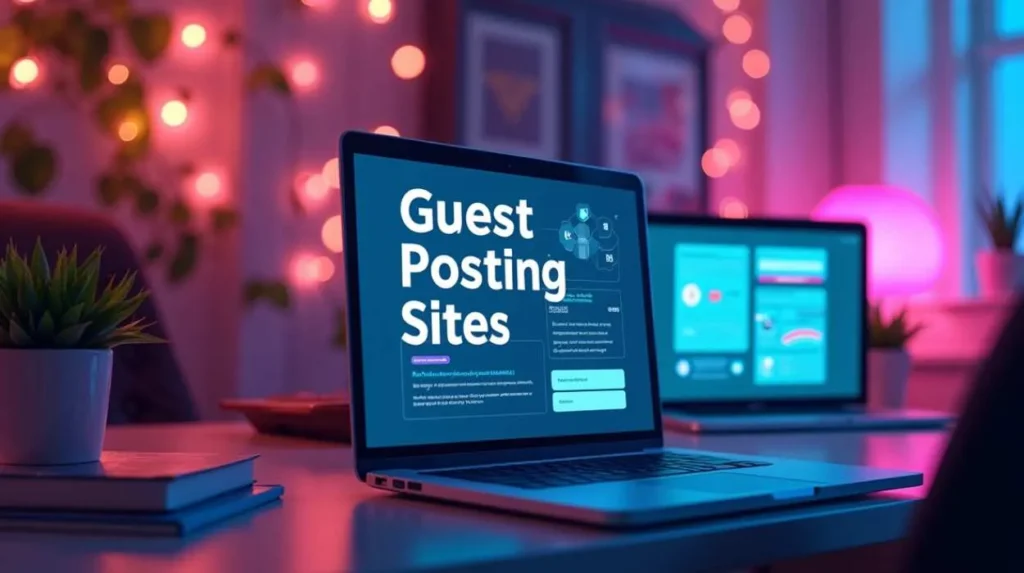Have you ever shared a story in your school magazine or a local newspaper? If so, you’ve already experienced a form of guest posting—a powerful way to share your ideas with a broader audience and grow your personal blog or website. In today’s digital world, this practice has evolved into a significant strategy for writers and businesses to build visibility, authority, and meaningful connections online.
To understand its impact, consider this: over 70 million new posts are published on WordPress every month. Research by Orbit Media shows that bloggers who contribute guest posts often report stronger performance for their own blogs. In fact, websites with blogs receive nearly 97% more inbound links than those without. With 60% of blogs publishing 1–5 guest posts monthly, it’s clear that guest posting has become one of the most effective and popular ways to grow your reach and credibility online.
In this guide, we will explore what guest posting is, and will provide you list of 300+ Guest Posting Sites.
What Is Guest Posting?
Definition:
Guest posting is simple. It is writing an article on another person or a blog.
Suppose that your friend has a popular video games blog. You are also a lover of video games, and you write an excellent article about your favorite new game. Your friend likes your article and decides to publish it to his/her blog. At the top, you are the author of your name. That’s a guest post! Their website features you as the guest writer.
Businesses and individuals do this regularly in the online world. An individual who enjoys traveling may contribute a guest post on one of the large travel sites. One of the chefs may submit a recipe in a well-known food blog.
Importance:
But why would you waste your time writing on the guest posting sites of someone else? It appears to be additional work, but it has some incredible advantages.
- Reach New People: There are already readers of the blog that you write for. When you make a guest post there, all those readers will be able to see your work. It is as if you are presented with an entire new circle of friends that share the same interests with you.
- Create Your Image: As soon as your name appears on a famous site, people begin to regard you as a specialist. In case you write a helpful article about gardening on a popular blog about gardening, the readers will believe that person really know about plants! This creates trust, and people desire to hear more of you.
- Increase Traffic to Your Self-Site: Generally, in your guest post, you have the chance to add a brief Author Profile at the bottom. Here you may include a link-back to your own site. When people like your article, they will probably visit that link to get to know what you have more to share. This attracts new visitors, also known as traffic, to your site.
- SEO Your Website: It is a large one, and we will discuss it further below. Getting a link on another website to your site is like getting a vote of confidence. It informs search engines such as Google that your site is reliable and significant.
Why Guest Posting Matters for SEO?

Guest posting isn’t just about writing for other blogs—it’s a powerful way to boost your SEO. Here’s why:
- Get Quality Backlinks: Every guest post usually gives you at least one link back to your site. Search engines love this—it’s like a vote of confidence.
- Build Authority: Posting on reputable blogs makes you look like an expert and boosts your site’s credibility.
- Drive Targeted Traffic: Readers from relevant blogs are more likely to visit your site and engage with your content.
- Grow Your Brand: Your name and brand get exposure to a new audience, which helps people recognize and trust you.
- Long-Term Benefits: Unlike ads, guest posts keep sending traffic and backlinks months (or even years) later.
What criteria does it use to determine the best ones?
Not all sites are created equal—choosing the right ones is key. Here’s what to look for:
- Domain Authority (DA) / Domain Rating (DR): Higher DA/DR sites pass more “SEO juice” to your site. Aim for reputable sites with strong authority in your niche.
- Relevance / Niche Fit: The site should cover topics related to your industry. A backlink from a niche-relevant site is much more valuable than a random one.
- Traffic & Audience Engagement: Check if the site has active readers—comments, shares, social presence. More engaged audiences mean higher potential traffic to your site.
- Quality Content Standards: Good sites maintain high-quality, well-edited content. Avoid spammy sites—they can hurt your SEO instead of helping.
- Backlink Policy / Do-Follow Links: Make sure the site allows do-follow backlinks, so your SEO benefits. Some sites use no-follow links only, which offer less SEO value.
- Editorial Guidelines & Acceptance Rate: A professional site has clear guidelines for guest posts. Knowing this helps you pitch better and increases the chance of acceptance.
- Social Media & Sharing Potential: Sites with active social media presence amplify your reach. Your content can get shared beyond the original post, driving even more traffic.
How to Find Free Guest Posting Sites
All right, you are now prepared to begin guest posting. What are some of the sources that will take your articles? You do not have to use costly equipment. These are the most effective methods of getting free guest posting opportunities.
1. Use Google Search Strings
This is the easiest method. Google requires special commands to locate sites that accept guest writers. Most of them possess a section entitled Write for Us or Guest Post Guidelines.
These are some search strings that you can use. Use your subject of interest, e.g. health, technology, and travel.
- “Topic” + “write for us”
- “Topic” + “guest post”
- “Topic” + “guest article”
- “Topic” + “become a contributor”
- subject matter + submission guidelines.
As an illustration, when you wish to write about cooking, you can search:
- “cooking” + “write for us”
- “food blog” + “guest post”
It will present you with a list of food blogs whose pages have indicated the invitation to guest authors.
2. Where Your Competitors Are Writing
In case you have other blogs like yours, you can check where they post guest articles. When a location takes its post, maybe it will take yours as well.
How do you do this? Free backlink checker tools are used online. You need to enter the address of your competitor and the tool will show other sites that have been linked to the competitor. Check the list of blogs that have their guest posts. A guest post is mostly easy to identify through the title or the name of the author.
3. Search on Social Media
Numerous blogs and editors post on websites such as Twitter and LinkedIn that they require guest writers.
On Twitter, you can find such hashtags as #guestpost, #writeforus, or #guestauthor. You may also use such phrases as looking for guest writers. You may come across a tweet by an editor who is looking to write an article on a given topic. And this is a fast method of locating real-time opportunities.
4. Join Online Communities
Bloggers and writers have numerous online communities, including Facebook groups or forums like Reddit. Within these communities, individuals post the opportunities of guest posting.
Create communities around your niche and monitor the posts where individuals seek to have their articles published. You may also be seeking opportunities to guest post yourself.
High DA Guest Posting Sites List
250 Free Guest Posting Sites List for SEO
How to Submit a Guest Post: Step-by-Step Guide
After locating a website to which you want to write, what do you do? By doing the right things, you will have a significant chance of having your post accepted.

The First Step: Read their Guidelines
Nearly all blogs that accept guest posts have a page titled either Guest Posting Guidelines or Write for Us. Read it very carefully. It will tell you:
- What topics do they cover?
- The length of your article (e.g.,1000-1500 words).
- How to compose your article (headings, short paragraphs).
- How to post your article (as a Google Doc or a Word file).
- What to include in your email.
- Violation of these rules is the quickest way of having your submission rejected.
Step 2: Brainstorm Ideas for Unique Articles.
Do not merely write about a general subject. Brainstorm some particular and intriguing ideas about your article. You want to choose an idea, but you should first search their blog to ensure that they have not already published a very similar one. The most appropriate ideas are new, useful and best suited to their audience.
An example is that instead of a broad concept such as tips to travel, a more suitable concept would be 5 ways to save money on food when travelling in Southeast Asia.
Step 3: Write Your Pitch Email
A pitch is a brief email that you write to the editor of the blog. It is your opportunity to impress the first time. Keep it short and to the point.
Your email should include:
- Customized welcome (attempt to locate the name of the editor).
- A short background about yourself.
- Your article ideas (usually 2-3 options). Give a brief explanation of what each article would be about.
- A link to your personal blog or a writing sample.
- A polite closing.
Step 4: Write the Guest Post
After the editor has accepted your idea, you can now start writing. Keep their audience in mind. Write in a manner that is similar to the other posts on their blog. Make your helpful paper enjoyable and easy to read. Do everything they advise you.
Step 5: Edit and Proofread
Proofread your article a few times to identify spelling errors, grammatical mistakes, and typing mistakes. The article with a lot of mistakes appears unprofessional. You can have free applications, such as Grammarly, to assist you or have a friend read it to you.
Step 6: Post and Wait (Be Patient)
Send your paper just as the instructions instructed you to. After you send it, be patient. Editors are occupied individuals and they may take a week or two (or more) to respond to you. After two weeks, you should not hear anything, but it is alright to make a follow-up letter politely.
Guest Posting Writing Best Practices
These are just but simple best practices to ensure that your guest posting sites are a massive success.
- Write to their audience, not to yourself: Before you put a single word in a post, read other posts on the blog. Know who their readers are. What is the language they speak? What are the issues that their readers are attempting to address? Write that post to serve that particular audience.
- Deliver Your Best: Do not consider a guest post any less important than an article on your site. Provide them with your most useful, helpful, and interesting material. Good content is shared more meaning you have more readers.
- Easy Reading Format: No one would like to read a huge wall of text. Divide your article into small bits so that it is easy to scan. Short paragraphs, bold text, clear headings, and bullet points should be used to highlight the important ideas.
- Be Not over Promotional: You should aim to inform or help the reader and not to promote your product or service. There is no problem with referencing your own site in the author bio, however, the article itself is about delivering value.
- Add a Good Author Bio: This is your little room to shine. It is normally 2-3 sentences at the culmination of the posting. Write a brief description of yourself and what you do and make sure to also insert the link to your site.
How to Accept Guest Posts in Your WordPress Site
But what about having your own WordPress site, and you want other individuals to write on your behalf? Guest posting can be an excellent idea to receive new material and establish contacts with other authors.
The simplest solution to this in WordPress is to create a new user account of your guest writer.
- Enter your WordPress account.
- Go to “Users” and click “Add New.”
- Enter the information of a user (username, email, etc.).
- Their most significant course of action is to establish their Role. Do not turn them into an Administrator. The most appropriate position of a guest poster is that of a contributor.
- A “Contributor” can write and edit their own posts, but they are not able to publish them. This is for your safety. The Administrator will have the opportunity to go over the post and publish it at their own time.
- When you open their account, they will be able to log in and post their article on your site itself.
Do-Follow vs. No-Follow Links: What You Need to Know
Backlinks are votes for the guest posting sites. The ballots are valued differently at Google. This is the reason why we distinguish do-follow and no-follow links.
Do‑Follow Links
Regular links are do-follow links. By providing one to you, a site is telling search engines: We have faith in this site and we are transferring our authority to it. The most significant SEO advantage of these links is that they are the powerful votes that we referred to. All the links are do-follow unless they are altered by someone.
No‑Follow Links
No-follow links contain a tiny code (rel=nofollow) to indicate to the search engines that they should not accord the links any SEO advantage. That would be tantamount to saying, Here is a link to another site, which our readers can visit, but we are not recommending it.
Are no‑follow links useless? No. Even a no-follow link on a vast site such as Forbes can be of great help in getting numerous real visitors to your site. It also naturalises your backlink profile to Google. An effective backlink system must have do-follow as well as no-follow links.
When you are searching to find guest posting sites, you should aim to receive do-follow links, however, you should not miss great opportunities that have no-follow links only, particularly when the site has large number of active readers.
Guest Posting: Common Mistakes to Avoid
Guest posting sites are quite potent, and there is a tendency to commit some errors that are detrimental to your prospects. The following are some of the pitfalls.
- Writing on low-quality sites: It is not worth posting on any site that accepts every posting. An association with a spammy, low-quality site would damage your SEO. Target respected niche sites.
- Sending a general email to the whole list: There are a lot of pitches every day to the editors. Such a generic email as Dear Sir/Madam, I would like to write on your behalf, is likely to pass over the head. Make your email personalised- address the editor by his or her name and mention something that you enjoyed in his or her blog.
- Disregarding the guidelines: This is the most serious error. In case the editor requests 1,000 words, and you write 500, he or she will not accept it. In the event that they say no promotional links, omit those.
- Posting badly composed content: Your guest post speaks of you and your brand. You look unprofessional in terms of spelling errors and poor grammar.
- Failing to promote your post: Once it is published, you are not done. Post it on your social media and email list. This will generate more traffic, satisfy the editor and establish a good rapport.
Conclusion: The Most out of Guest Posting
Guest posting sites are not only a method of receiving backlinks. It assists in the development of relationships, the creation of authority, and the new audiences.
When done right, it’s a win‑win. The host blog receives a free quality article for its readers. As the guest writer, you receive exposure, traffic and a powerful backlink, which enhances the authority of your site among search engines.
The trick is to work on quality and not on quantity. Instead of producing 10 average posts on mediocre blogs, get down to writing one or two great posts on your respected sites in your niche. Be tolerant, professional and always look to deliver actual value to the reader. With this, you will realise the massive potential of the benefits of guest posting to expand your online presence.
FAQs
1. Is guest posting free?
Yes. The majority of authentic guest posting is free. You post a good article and receive a link and exposure. You should not be fooled by those websites that require you to pay since Google does not like unpaid links that are not highlighted.
2. What is the optimal length of a guest post?
The length will be based on the regulations of the site. Some would love short posts of 800 words or less, and others would love long posts of 2,000 or more.
3. What is a backlink again?
Backlink- This is a link from one site to another site. That is the way search engines identify and rank pages.
4. Is there any way in which guest posting will be detrimental to my site?
Yes, it can. When you post on low-quality, spammy websites (so-called PBNs), Google may consider it cheating and penalise your site, which will reduce it in rank.

